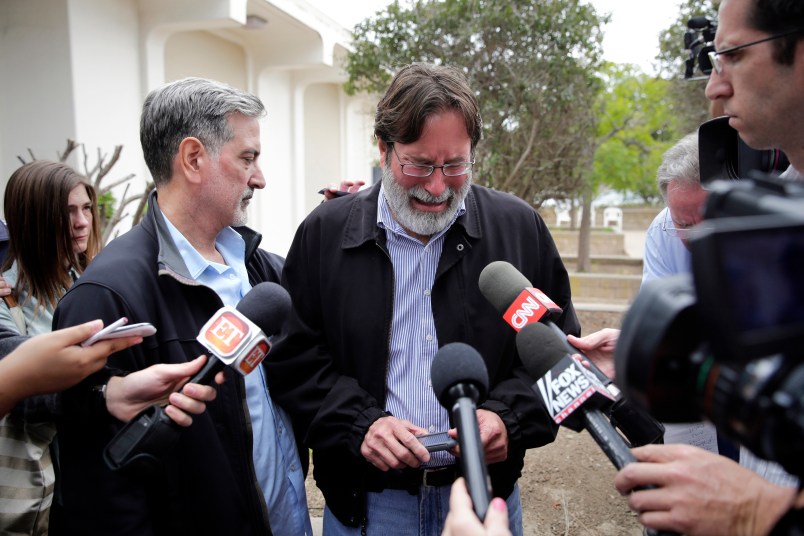LOS ANGELES (AP) — Richard Martinez thinks of his son every day, and with those thoughts come the constant reminder of a young life cut tragically short by a troubled man with a gun.
That is why, the 61-year-old attorney says, he crisscrosses the country, poking and prodding people to support what he calls reasonable gun-control laws. It has become his life.
“I’m not anti-gun,” Martinez is quick to say. “I’m anti-gun violence.”
Martinez had just gotten off the phone with his son, Christopher Michaels-Martinez, on the night of May 23, 2014, when the sophomore English major at the University of California, Santa Barbara, decided he would head to a nearby deli for something to eat.
Within minutes, Michaels-Martinez would become one of six UCSB students killed by Elliot Rodger, an emotionally troubled 22-year-old toting three semi-automatic weapons and more than 400 rounds of ammunition.
The next day Michael-Martinez’s father would become the public face of grief when he traveled from his central California home and angrily stepped in front of TV cameras for the first time. He shouted that his son had died because of “craven, irresponsible politicians” who lacked courage to enact responsible gun-control laws.
“They talk about gun rights,” he growled between sobs. “What about Chris’ right to live?”
A year later, he has set aside his law practice, joined the group Everytown For Gun Safety and spends about two weeks of every month on the road, meeting with politicians and counseling others who have lost loved ones to gunviolence.
On the surface, Martinez would appear an unlikely gun-control advocate. Growing up on a farm, he was an avid hunter and he still supports the rights of hunters and target-shooters.
But now everywhere he goes, he preaches the need for new gun laws. He’s been to Texas, Tennessee, Pennsylvania and several other states, racking up wins and losses along the way, and always wearing the watch his son had on the night he died.
In Florida, where Martinez delivered 60,000 postcards to the governor, a proposal he opposes that would allow people to carry concealed weapons onto college campuses is advancing through the Legislature. In Washington state, where he walked precincts and worked a phone bank, voters passed a law last year increasing background checks for gun buyers.
Meanwhile, his home state of California became the first in the nation to allow police to go to court to seize guns of people they or family members believe are dangerous. The bill was drafted after the Santa Barbara rampage, and Martinez supported it. Gov. Jerry Brown signed it.
Had that law been in effect at the time, Martinez says, there’s a chance the life of his son might have been spared.
Before Rodger set out on his deadly rampage his hate-filled rants on social media had grown so bizarre his mother was concerned. Police were asked to check on him. They did but didn’t find the cache of weapons and ammunition he kept in his apartment.
Even if they had, they said at the time, they likely couldn’t have taken them because they had been acquired legally.
Soon afterward he stabbed three people to death in his apartment before driving across the college town of Isla Vista, shooting randomly at people. Michaels-Martinez and two women standing in front of a sorority house were killed.
As police closed in, Rodger pointed one of his guns at his head and pulled the trigger. He died at the wheel of his car, which crashed into another vehicle.
“The kid that killed my son should never have had a gun, and we have to figure out a way so that these things don’t happen again,” Martinez said by phone as he prepared to return to Santa Barbara this week for a memorial Saturday honoring those killed.
“They didn’t used to happen,” he continued with grim resignation. “They don’t happen in other countries. We need to figure this thing out.”
Copyright 2015 The Associated Press. All rights reserved. This material may not be published, broadcast, rewritten or redistributed.







Good luck Mr.Martinez. If you can’t even get anyone to comment on a “liberal” website, good luck with changing the gun culture folks
I met Mr. Martinez at a Moms Demand Action meeting this year. He is a powerful advocate for sensible gun laws. I joined the group because a shooting at a mall by the school where I worked traumatized several students who were hanging out in the food court after school. Holding a sobbing, terrified child with no way to comfort her is not something I want to do again, nor do I want others to experience it.
Thanks in part to Mr. Martinez’s advocacy, Oregon has closed a major loophole in gun sales and is about to pass a law to remove guns from some domestic abusers. So, I’d say he was doing pretty well.
Thank you very much for your perspective and experiences. It makes it real for the rest of us.
“They talk about gun rights,” he growled between sobs. “What about Chris’ right to live?”
The only time Republicans profess to care about the rights of victims is when they’re defending the death penalty.
I am glad to hear that